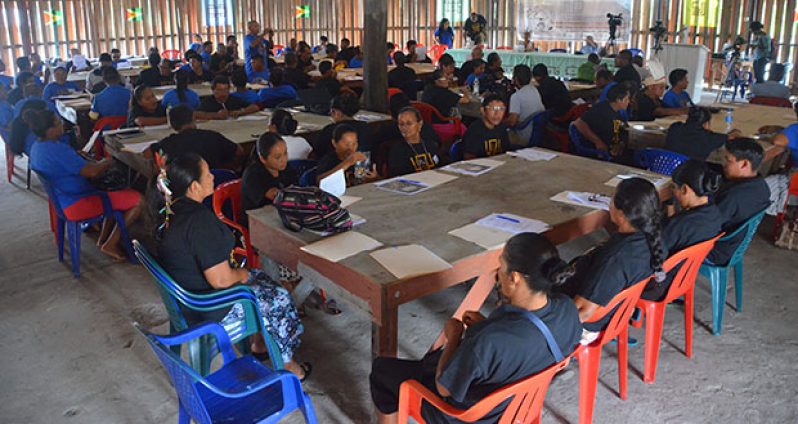–land titling, projects under review
By Ravin Singh
HAVING been unavoidably delayed for more than two years, the ninth General Assembly of the Amerindian Peoples Association (APA) commenced on Tuesday, with deliberations expected to focus on land tenure security and several climate change projects.

Pakuri, a community in St. Cuthbert’s Mission, was chosen to host the three-day event, which will conclude on Thursday evening, by which time a new executive committee would have been elected through a voting process prior to being installed.
The General Assembly, ninth for the APA, was officially opened with formal proceedings, which included cultural presentations from indigenous children in the community.
CURRENT PROJECTS

Sharon Atkinson, President of the APA, spoke at the opening of the General Assembly, hinting at topical issues which are expected to dominate the forum. She noted that current projects, including one for land tenure assessment and another for which the Rainforest US (RFUS) is providing support funding, will be discussed during the General Assembly.
APA just recently signed an agreement with RFUS for project support funding that has the potential to cover a five-year period out of the Norway’s International Climate and Forest Initiative (NICFI).
NICFI aims at supporting efforts to reduce greenhouse gas emissions from deforestation and forest degradation in developing countries (REDD+). Reducing such emissions could deliver a quarter of the climate change mitigation the world needs to stay on a two-degree warming pathway towards 2030.

And this agreement, Atkinson said, signals a return of funding support through RFUS, and a continuation of technical support that the organization has provided over the years.
“The Forest Peoples Programme has especially been steadfast in its support of the work of the APA through the years since the last General Assembly,” she said.
As it relates to the Land Tenure Assessment (LTA) Project, the APA President explained that this project began in early 2012 and continues at present. According to her, its main aim has been to secure a better understanding of indigenous land tenure and to document the situation of indigenous lands’ tenure security at the community, district, territorial and regional levels. This is aimed at filling the existing gap in reliable information when arguing for indigenous land rights, she added.
“The APA has always maintained that effective and sustainable actions to protect forests through climate change mitigation actions will also require strong actions to secure indigenous peoples’ rights,” Atkinson said.

This project began with training on how to conduct research for the project; then moved into field visits in Region 2, to engage in actual field work. It later extended into Region 1, and most recently into Region 8.
According to Atkinson, it is expected that this project will continue into the other regions in the coming years, with continuing support from the Forest Peoples Programme and with the Rainforest Foundation newly stepping in to support through funding from the NICFI.
Atkinson disclosed that 25 years after its establishment, the APA continues to face tremendous challenges, as it was in the past; but hard work and dedication by the staff and supporting members is what has kept the association moving forward.
CHALLENGES
Among some of the major challenges she highlighted were political pressure and intimidation, which included the maligning of personalities and physical threats, and the lack of funding which has resulted in a scaling down of APA outreach to the communities during reporting periods.
But despite these setbacks, she was happy to announce that several successes were recorded by the body, whose efforts to advance the cause of indigenous peoples have been invaluable. Among these were APA’s participation in various international events that addressed indigenous rights and issues; the holding of sensitization meetings which were held with a number of foreign missions, state agencies, organisations and others involved in indigenous issues; and legal support in land-related issues, which has been provided to the communities by the Forest Peoples Programme and legal counsel Nigel Hughes.
Minister within the Ministry of Indigenous Peoples’ Affairs, Valerie Garrido-Lowe, reminded the attendees during her presentation that the Government remains committed to establishing an Indigenous Lands Commission.
“Our land is our life…we farm, fish and hunt there; and our way of life has protected the environment,” the Minister said.
She encouraged those in attendance to sit and map out their future, since they had been too reliant on Government to do this, to no avail.
Further, she noted that emphasis needs to be placed on education within indigenous communities, since this is the building block of a strong, sustainable community and by extension a strong sustainable country.
“When regions are developed, the country develops,” Minister Garrido-Lowe declared.
Short presentations during the opening were also made by Programme Administrator Jean La Rose, Legal Counsel Nigel Hughes, and local Toshao Lonox Schuman.
The event continues today.



.jpg)









